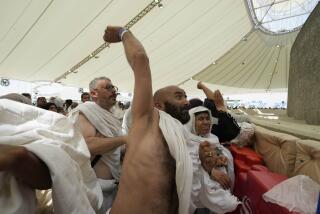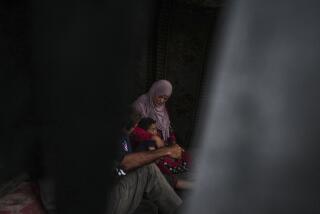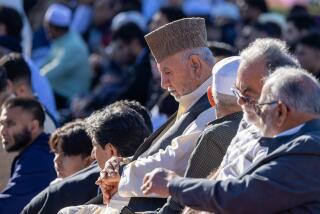For Many, Eid al-Fitr Completes This Holiday Season
This week, the Muslim month of Ramadan comes to an end. If the new moon is sighted tonight, the celebration called Eid al-Fitr will take place on Friday with prayers and feasting. All month, Muslims in the U.S. have fasted from sunrise to sunset, taking neither food nor drink, not even water. When the lunar month falls at this time of year, the hours of fasting are short, sunset coming around 4:15 p.m.
Even so, it requires real discipline. I have seen it up close this year, as a family of Kosovar teens, now part of our household, take a midnight snack, go to bed and don’t eat or drink again until they gather the next afternoon for iftar, the breaking of the fast with dates and a glass of water.
As the U.S. Muslim population of about 6 million continues to grow, we are all learning more about Islam. Marking Ramadan in the distinctive ceremonial and public ways we do is part of this learning process. Mayors, city councils and governors make proclamations of Ramadan, even in mid-America.
With Muslim employees part of the work force, the iftar fast-breaking is a way to acknowledge their presence. In 1996, the American Muslim Council helped organize the first iftar on Capitol Hill in Washington for staffers and office employees.
During Ramadan last January, there was a first-ever iftar at the U.S. Pentagon. It was held on the holiest night of the month, called Laylat al-Qadr, the “Night of Power”--by tradition the night when the angels drew near the Earth and God began to reveal the Koran to the Prophet Muhammad.
Deputy Secretary of Defense John J. Hamre spoke to Muslim Pentagon employees. “I am a Lutheran in my own religious background and not a Muslim,” he said, “so I cannot fully appreciate how important this ‘Night of Power’ is for all of you. But I can understand why this ‘Night of Power’ is deeply important to you, because I am a religious person myself.”
Last month, Secretary of State Madeleine Albright hosted the first iftar at the State Department. In her remarks, Albright rejected the notion of a “clash of civilizations” between the West and Islam.
Speaking to the Muslims gathered in the Thomas Jefferson Room, she encouraged Muslim participation in government. “I ask your help in urging young people in your communities to think seriously about becoming part of America’s foreign policy team,” she said.
The White House has also played its symbolic role in taking notice of Islam’s American presence. In 1996, First Lady Hillary Rodham Clinton hosted the first Eid al-Fitr observance at the White House.
These milestones are important, symbolic ways of marking our progress as an increasingly multi-religious nation. Most of them don’t make the headlines, but they testify all across the United States to the vibrant presence of good neighbors, American Muslims.
More to Read
Sign up for Essential California
The most important California stories and recommendations in your inbox every morning.
You may occasionally receive promotional content from the Los Angeles Times.










